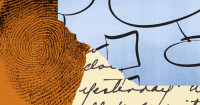
The “Plotter vs. Pantser” Writing Divide Has Been Exaggerated
tor.com – Wednesday December 28, 2022

When it comes to outlining vs. improvising, I’ve found that we all do the same steps in a different order.
Many writing conversations (whether on panels, in blog posts, etc.) discuss a plotter vs. pantser binary, plotters being outliners, authors who plan work thoroughly before beginning, while the pantser, from the expression “fly by the seat of your pants” plunges into writing the beginning without a plan. I myself am certainly the plotter archetype, producing reams of notes, spreadsheets, and outlining a whole series before beginning Chapter 1, but the more I talk with friends who fit the pantser archetype, the clearer it becomes that the two methods are not as different as they’re made to seem. The real difference is not what we do, but what order we do it in, which steps we do before, which during, and which after drafting the text.
Literary Agents
By Lakshmi Raj Sharma
Novelist and Professor of English
firstwriter.com – Wednesday December 28, 2022
Literary agents and their meticulous work fascinate me. I presume several other authors feel the same about them. Perhaps agents are equally immersed in and captivated by the publishing process. Theirs is most definitely a labor of love. Agents have to be fervent about good ideas, unstoppable at the bargaining table, shrewd in judgment and advice, and brilliant at editing. There's no doubt that we authors need literary agents in the contemporary publishing scenario. Without them we are like fishes out of water. They know things that authors do not. They, therefore, bridge the gap between publishers and them, and, in some cases, become protectors. Authors feel insecure in their professional worlds without supportive agents. Of course not all agents are the same. Some who fall into the wrong profession can become the cause of authors dwindling into nothing.
I propose to hold the mirror up to agents and do for them what they have very kindly been doing for authors. Fully realizing the complexity of their job, I will try to suggest how agents might help authors even better. I believe I can do this because the work of literary agents lures me and I read with interest virtually everything related to them. What I say here will include some of the problems faced by authors living in countries like India. Living in such countries and writing to the world at large is no easy task because of confusions that arise because authors and agents belong to different cultures.

Big Names in Little Magazines: On Thomas Pynchon’s Very First Literary Journal Appearance
lithub.com – Thursday December 22, 2022

“Thomas Pynchon is a young writer, just twenty, who has previously published fiction in Epoch. He is a Cornell graduate and now lives in Seattle.”
Writers know that the time between when a piece is accepted by a literary magazine and when it is actually published can be rather protracted—my longest span was three years—and by the time Thomas Pynchon appeared in the Spring 1960 issue of The Kenyon Review, he was a still-young 23. He’d just graduated from Cornell, his time there split by a stint in the Navy. He worked for Boeing in Seattle—writing for Bomarc Service News, an internal newsletter.
Although tasked with writing technical pieces about anti-aircraft missiles, Pynchon was characteristically wry. In “The Mad Hatter and the Mercury Wetted Relays,” Pynchon informs readers that Lewis Carroll’s Mad Hatter had gone mad from “chronic mercurialism” or “hatter’s shakes,” which could affect Boeing workers if certain wire-wrapped glass capsules explode. “When dealing with mercury,” Pynchon warns, “even in small amounts, respect it and play it safe. Don’t become a ‘Mad Hatter,’ you might find it to be much more unpleasant than attending a mad tea party.”
The same jaunty rhythms mark “Entropy,” Pynchon’s story in The Kenyon Review. Although he would later dismiss the piece as an example of “overwriting,” something “too conceptual, too cute and remote,” the story is playfully chaotic—the type of glorious excess for which literary magazines are made.

The World Of Book Publishing Is A Mystery To Many, So We Did Our Best To Show You Behind-The-Scenes
buzzfeed.com – Monday December 19, 2022

Just because an author's name is what's on the front of the book, doesn't mean they're the only one involved!
Do you ever think about how something can go from words on a document to a gorgeous bound book you can hold in your hands?
For books that are traditionally published, this process can take several steps and many different people behind the scenes. So, we wanted to dive in and see what a day in the life might be for folks who are in some of these positions, and luckily, we get to share that with all of you!
Quick reminder, though, that every publisher is different, and every process is different.
Let's imagine this as a journey for our completely and totally made up author Will Shakespeare. Hi, Will! (See below.) In this piece, we'll go through some of the steps you might see in the course of a book's voyage and talk to some epic people who are part of these journeys. Let's get into it.

How To Publish Your First Book and Sell It Online?
chartattack.com – Saturday December 17, 2022

Are you an aspiring author who dreams of seeing their name on the bestseller list? Publishing a book can be an incredibly rewarding experience, but it can also be quite challenging. In this blog post, we will outline a step-by-step guide on how to publish your first book and sell it online. We’ll also discuss some helpful tips and tricks that will make the publishing process easier for you. So, if you’re ready to take your writing career to the next level, keep reading!

Could an A.I. Chatbot Rewrite My Novel?
newyorker.com – Saturday December 10, 2022

During one of my more desperate phases as a young novelist, I began to question whether I should actually be writing my own stories. I was deeply uninterested at the time in anything that resembled a plot, but I acknowledged that if I wanted to attain any sort of literary success I would need to tell a story that had a distinct beginning, middle, and end.
This was about twenty years ago. My graduate-school friends and I were obsessed with a Web site called the Postmodernism Generator that spat out nonsensical but hilarious critical-theory papers. The site, which was created by a coder named Andrew C. Bulhak, who was building off Jamie Zawinski’s Dada Engine, is still up today, and generates fake scholarly writing that reads like, “In the works of Tarantino, a predominant concept is the distinction between creation and destruction. Marx’s essay on capitalist socialism holds that society has objective value. But an abundance of appropriations concerning not theory, but subtheory exist.”
I figured that, if a bit of code could spit out an academic paper, it could probably just tell me what to write about. Most plots, I knew, followed very simple rules, and, because I couldn’t quite figure out how to string one of these out, I began talking to some computer-science graduate students about the possibilities of creating a bot that could just tell me who should go where, and what should happen to them. What I imagined was a simple text box in which I could type in a beginning—something like “A man and his dog arrive in a small town in Indiana”—and then the bot would just tell me that, on page 3, after six paragraphs of my beautiful descriptions and taut prose, the dog would find a mysterious set of bones in the back yard of their boarding house.
After a couple months of digging around, it became clear to me that I wasn’t going to find much backing for my plan. One of the computer-science students, as I recall, accused me of trying to strip everything good, original, and beautiful from the creative process. Bots, he argued, could imitate basic writing and would improve at that task, but A.I. could never tell you the way Karenin smiled, nor would it ever fixate on all the place names that filled Proust’s childhood. I understood why he felt that way, and agreed to a certain extent. But I didn’t see why a bot couldn’t just fill in all the parts where someone walks from point A to point B.

Sam Lipsyte on the What and the How of Writing
lithub.com – Friday December 9, 2022

Content and style are not separate things. They are different aspects—the what and the how—of the same thing. By the how I mean the way certain syntactical arrangements of words set off chains of thought and emotion and even physical sensation in the reader, create a kind of energy field within which one experiences the text. By the what I just mean whatever somebody is writing about: love, work, art, war, school, politics, sex, faith, family, death. Life, basically, life with others and life alone, the end of life. This is the content. Style is your filter on all of this, the way you see it and feel it— tragically, tragicomically—and how it summons language in you, how life comes to be alive on the page.

Creative Writing Prompts to Get Your Brain in Gear
rismedia.com – Tuesday December 6, 2022

Writing is an easy way to escape reality and enter into a world of your own. Unfortunately, writer’s block is a nasty beast that loves to rear its ugly head at the most inopportune moments. Inspiration is undoubtedly the most effective weapon against this monster. Explore these five creative writing prompts to get your imagination moving and your pen flying across the paper.

Print on demand pays off
thebookseller.com – Tuesday December 6, 2022

When I founded Mensch Publishing, I determined to use the business to test out different ways of doing things. At an author level my terms involved zero advances, world rights all languages, and a relatively high net receipts royalty. Most of the books I have published are brilliantly supported by the Bloomsbury salesforce worldwide and by using their excellent production and rights departments.
But I wanted to try an experiment using print-on-demand technology for an out-and-out trade book with the author’s and agent’s permission. The book in question is Philip Norman’s wonderful memoir of Fleet Street high jinks and catastrophes, We Danced on Our Desks, which we are publishing in original paperback and e-book on 12th December.

AI Reveals the Most Human Parts of Writing
wired.com – Friday December 2, 2022

A WOMAN HAS been working on her book, a young adult fantasy novel, for hours. At some point, she gets the familiar itch to check her email: She can’t think of what to write next. She stares at the screen. She’s lost her words. She could bang her head against the wall, or maybe turn to a favorite book for inspiration, or lose her momentum to distraction. But instead she turns to an AI writing tool, which takes in her chapter so far and spits out some potential next paragraphs. These paragraphs are never quite what she wants, though they sometimes contain beautiful sentences or fascinating directions. (Once it suggested a character sings a song, and also generated the lyrics of the song.) Even when these paragraphs fail, they make her interested in the story again. She’s curious about this computer-generated text, and it reignites her interest in her own writing.
Get the free newsletter | Submit a news item or article | Get Writers' News for your website





